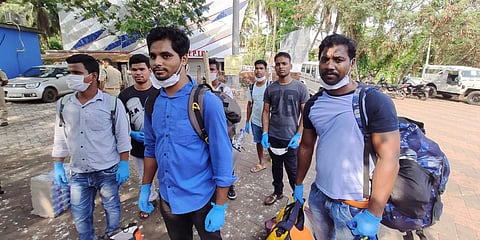

KASARAGOD: Anand Thakur (24) was standing in one of the last circles drawn to maintain social distancing in front of the Kanhangad railway station. He was among the 1,140 migrant workers heading for Jharkhand from Kasaragod district. A special non-stop train -- with 28 coaches -- is taking them to Jasidih Junction in Deoghar district on Thursday.
Thakur, in blue shirt and blue gloves, stood out because he had just one backpack, and a cricket bat was jutting out from the bag. "I love cricket and play every evening," he said. It was not surprising when he said he was from Ranchi, the homeland of MS Dhoni.
For the past four years, Thakur has been working as a bellboy in Taj Vivanta in Udma. But COVID-19 hit his fortunes as much as it hit the hospitality industry. From 300, the staff strength has come down to 50, he said. "Today, seven of us are going home," Thakur said, pointing at young men standing in circles around him. They were the best protected of the lot, all wearing blue surgical gloves and masks.
On a multi-seater waiting chair placed outside the railway station, two-year-old Sadiya is slurping from a water bottle given by Kudumbashree. Her father Mohammed Shahabudeen -- an excavator operator from Koderma in Jharkhand -- brought her and his wife Sabeena to Kasaragod six months ago. "I thought we can be in Kerala for around two years before heading home," he said.
But COVID changed their plans. For the past two months, Shahabudeen and his friend Mohammed Ansari had no work. Every week, they used to send around Rs 3,000 to Rs 4,000 to their parents. But now, they were not only not sending home money, but their meagre savings were running out, too.
Ansari's father has farmland where he grows paddy and wheat. "We have just enough for our house. But if I don't work here, my father will have no money to buy food and medicines," said Ansari.
Mohammed Kamarul Ansari (24) of Chatra is another excavator operator who is disappointed that he had to go home. "We come to Kerala as you go to Dubai," said Kamarul Ansari, who has been working for a single construction equipment owner in Majeerpala in Manjeshwar for the past four years. "After going home, we will better only for a few days. Then we will have to look for a job. We hope our malik will call us back soon," he said.
Chatra is 230 km or 6 hours drive from the train's destination in Jasidih. When asked how he would go home on reaching Jasidih, Kamarul Ansari's confident reply was: "Hemant Soren will take care of it". His friend Rustam Ansari (21) was specific. "The way Kerala brought us to the railway station in a bus, our chief minister will also run buses to take us home," he said.
The Kasaragod district administration ran 30 buses to bring 1,140 persons from all the 38 panchayats and three municipalities to Kanhangad.
Every passenger above the age of 12 years was charged Rs 950 for travel and food and water. Each compartment with eight seats will have only five passengers to ensure physical distancing. "Apart from today's dinner, we bought them bread, biscuits, and bananas," said Pullur-Periya gram panchayat secretary Jayan P.
He was impressed with the migrant workers. "They are young men in their twenties but are fully aware of the situation. They were saving money and preparing for this journey," he said. In Pullur-Periya, most of the migrant workers are from West Bengal and Assam. While bidding bye to their friends from Jharkhand, they hoped their train would be next.
The nonstop train left Kanhangad at 8 pm and will reach Jasidih Junction at 8 pm on Saturday.